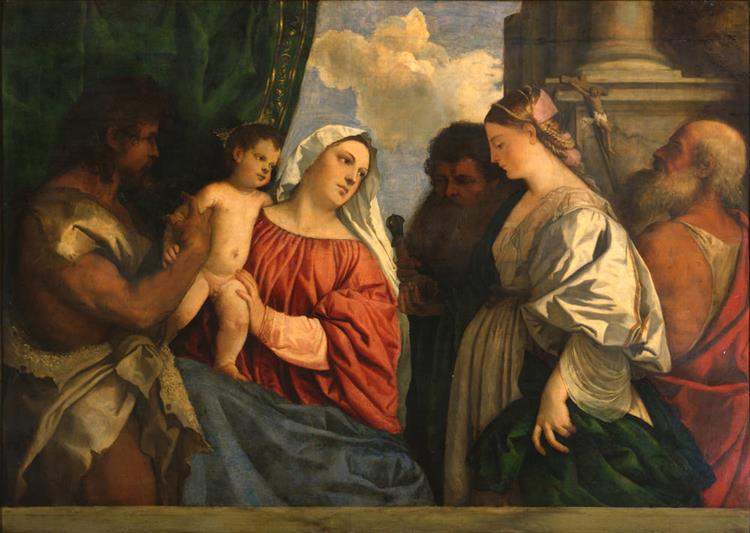Beschrijving
Titian's painting "The Virgin and Child with Four Saints" from 1518 is a work that encapsulates the mastery of the Venetian Renaissance, standing out for its dynamic composition and vibrant use of color. In this piece, Titian proposes a sacred conversation that promises an emotional fusion between the divine and the human, offering a visual encounter between the Virgin Mary, the Christ Child and a select group of saints.
The depiction of the Madonna and Child is placed at the centre of the composition, highlighted not only by their position but also by the radiance of Mary’s clothing, which shines in deep reds and deep blues. This masterful use of colour is characteristic of Titian, who manages to create a rich atmospheric depth through the superimposition of layers of brushstrokes. The light emanating from the Child highlights his innocence and divinity, contrasting with the serene adoration of the saints around him. The figure of St John the Baptist, for example, is presented with an almost carnal intensity, while the other saints, with their characteristic attributes, contribute to the narrative without distracting from the central figure.
The composition demonstrates a vertical organization that guides the eye through the work. The figures of the saints are arranged in a semicircle, creating a sense of inclusion and devotion. Each saint seems to be in tune, turning toward the Virgin as an angle of encounter, reinforcing the idea of the community of faith. The use of perspective is also noticeable in the position of the figures, where the background, although ethereal, establishes a space that emphasizes the proximity and connection between the heavenly and the earthly.
One of the most fascinating aspects of this painting is how Titian intertwines emotionality with materiality. The way the saints' garments flow and fold creates a sense of movement. The attention to detail in the textures of the fabrics provides a tangible quality that invites the viewer to not only observe, but to feel the scene.
Known for his skill in depicting light and color, Titian makes use of a rich, vibrant palette that draws the viewer in. Well-executed shadows and highlights give the figures a palpable three-dimensionality, making them almost emerge from the canvas. The choice of colors such as vibrant reds and deep blues not only sets the emotional tone of the painting, but also alludes to Christian iconography, where different colors often symbolize various virtues and states.
The historical context of this work cannot be overlooked. Painted at the height of the Renaissance, "The Madonna and Child with Four Saints" reflects the religious concerns of its time, as well as the growing importance of emotional representation in art. Titian, who was a pioneer in his time, amalgamates tradition with new artistic trends, establishing an innovative path in religious painting.
In conclusion, "The Madonna and Child with Four Saints" is not only a testament to Titian's unique talent, but also a profound exploration of the interaction between the divine and the human. Its composition, use of color, and emotionality make this work a magnificent representation of the Renaissance, inviting the viewer to contemplate not only the visual beauty, but also the spirituality that emanates from the interaction between the sacred figures.
KUADROS ©, a famous painting on your wall.
Hand-made oil painting reproductions, with the quality of professional artists and the distinctive seal of KUADROS ©.
Painting reproduction service with satisfaction guarantee. If you are not completely satisfied with the replica of your painting, we will refund 100% of your money.

